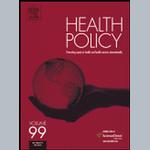Going beyond impact evaluation: Performance-Based Financing of Health Care Provision in Low-Income Countries
<div class="event-icon"></div> <span>Save this event in my Outlook calendar</span>
<div class="event-icon"></div> <span>Save this event in my Google Calendar</span>
Ottar Mæstad
Post from International Helath Policies
The PBF workshop in Bergen: Impressions and observations from a junior researcher
By Keovathanak Khim, PhD candidate at the University of Melbourne
Two trends were apparent in Bergen.
The first one was related to the need to better understand how different elements of PBF interact with and improve staff performance and health system functions and vice versa. For example, to what extent and in what context do financial incentives improve staff motivation or undermine intrinsic motivation; when and in what context do other mechanisms, e.g. encouragement and supervision, impact staff performance; when and how does empowerment of staff and managers impact interactions and communication within a system, and improve results? Participants agreed that qualitative approaches can address some of the current evidence gaps in PBF by explaining processes of PBF and the impact of the approach.
Second, many participants also emphasized the need for impact evaluation designs which are both methodologically robust and feasible in the field. Impact measures should be related to higher order- outcomes, such as changes in equity and efficiency in a health system, morbidity and mortality in a population, and issues such as catastrophic health care expenditure.
Global health problems tend to be complex and context-specific; they thus need an approach that is versatile and adaptable, such as PBF. PBF approaches promise to tackle and overcome health system constraints. These promises can be met with adequate research and documentation. This workshop represented another step forward in this direction by engaging researchers and practitioners in an open and fruitful dialogue and fostering a better understanding of PBF approaches. One can only hope that this workshop will be followed by other workshops of a similar nature. It is fair to say that workshops like this one are increasingly becoming the hallmark of the PBF community.
Blog posts before the work shop:
Performance based financing: Let’s try to have a more constructive conversation
In almost 15 years of commitment to a cause which is now known as PBF, I’ve heard plenty of different criticisms on PBF. Let’s say I’ve had my share. These criticisms are sometimes cautiously formulated or formulated as questions or hypotheses, but you often sense that the real dispute goes much deeper. Also, unfortunately, critics often mix different types of arguments. If such a strategy can be effective as a rhetorical strategy for a specific audience, it doesn’t necessarily help the debate, I believe.
To enable a more constructive discussion, it’s important to clarify the nature of criticisms by trying to identify the underlying causes of disagreement. In this blog post, I distinguish seven main elements of criticism. For each, we can also identify a possible solution.
1st pattern: A different informational basis
2nd pattern: Different analytical frameworks
3rd pattern: Different normative choices
4th source of disagreement: Speculation on different trajectories
5th source of disagreement: A conflict of interests
6th source of disagreement: The sociology of the field of international health
7th source of disagreement: Our “all too human” flaws
Conclusion
The PBF debate is crucial for the future of health systems in Africa in particular. We have crossed the Rubicon: the strategy is now present in almost all African countries. We thus encourage all PBF stakeholders and actors to focus on constructive contributions in order to ensure that these reforms are well done, and/or quickly amended if necessary.
The strategy can be improved and will continue to evolve: a health system should be seen in a dynamic way, and institutional arrangements which structure health systems should be revised when disadvantages outweigh benefits.
So we urge both critics and supporters of PBF to engage in a constructive discussion. This will ultimately benefit the population we have in mind.
Gaute Torsvik (University of Bergen) introduces the workshop in a blog on performancebased financing. Researchers studying PBF schemes should go beyond measuring impact only and explore how behavior responds to financial incentives: Why does behavior change?
“Introducing performance-based pay does not only make health worker financially accountable for their performance, performance based financing may also affect the level of supervision and community monitoring of health workers. Enhanced levels of recognition and appraisal of the work that is done may in itself motivate health workers to perform. Furthermore if incentives are based on team achievements, it has been documented elsewhere that workers tend to make an extra effort to avoid letting the team down. In addition there is now a large literature examining how monetary incentives interact with other extrinsic or intrinsic work motivations. Together this means that even if we observe that the introduction of performance-based financing makes the health workers more attentive and diligent, it is far from obvious why this is the case.
A scientific workshop gathering researchers and PBF experts
Answering the how and why questions regarding the health workers behavioral response to performance based financing is also a relevant question for PBF experts. More knowledge on this will indeed improve their understanding of the endurance and external validity of the measured impact. It will also enable them to improve the design of PBF schemes.
It is with this ambitious knowledge program in mind that the Chr. Michelsen Institute and the “Incentives for Health Provider Performance Network” will gather an international group of researchers and PBF experts during two days in Bergen, Norway. We expect very rich discussions between the two groups with the hope that such an innovative dialogue will contribute to better policies."
WORKSHOP BACKGROUND
Performance-based incentive schemes and reforms are receiving growing attention from governments, aid agencies, donors and researchers. As for Africa alone, 29 countries are today at least piloting a PBF scheme; three of them (Rwanda, Burundi and Sierra Leone) have adopted performance-based financing as a core component of the funding of their whole health system.
While operational knowledge has accumulated very rapidly, many questions remain from a more scientific perspective. Over the last years, the research program has mainly been steered towards demonstrating the impact of PBF strategies. This orientation, partly determined by the way many PBF pilot schemes are funded (a Trust Fund operated by the World Bank and funded by Norway and UK), leaves other questions in the dark.
PBF has been a source of debate for several years and it will probably remain so for some more years. In the follow-up of a recent debate triggered by a Cochrane Review, a call for innovative dialogue was issued.
Chr. Michelsen Institute in Bergen, Norway and the “Incentives for Health Provider Performance Network” are happy to invite international researchers and PBF experts to a scientific workshop on “Performance-based financing of health care provision in low-income countries: Going beyond impact evaluation”.
See detailed programme: Programme
Thursday 13 June
08.30-09.00 Coffee and registration
09.00-09.30 Welcome
09.30-11.00 Session I: Perspectives and Mechanisms
11.00-11.15 Coffee and fruit
11.15-12.30 Session II: Evaluating Impact: Findings from Cambodia
12.30-13.30 Lunch
13.30-14.45 Session III: Studies in Tanzania
14.45-15.15 Coffee and fruit
15.15-17.00 Session IV: PBF studies in the African Great lakes
19.30 Dinner at Zupperia. All invited.
Friday 14 June
09.00-10.30 Session V: Research protocols
10.30-10.45 Coffee and fruit
10.45-13.00 Session VI: Moving the PBF research program forward
11.15-13.00 Group Work
13.00-14.00 Lunch
14.00-15.30 Session VII: Discussion of group work
Please note: Participation by invitation only.
Publications

Informal payments and the quality of health care: Mechanisms revealed by Tanzanian health workers

Overworked? On the relationship between workload and health worker performance

Teaching business in Tanzania: Evaluating participation and performance
Projects

Priority setting in global health

Service Delivery Indicators: a pilot


